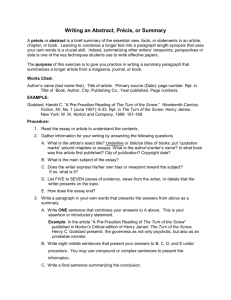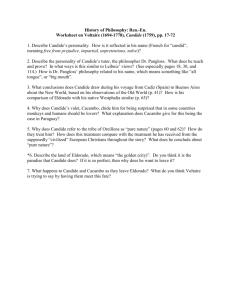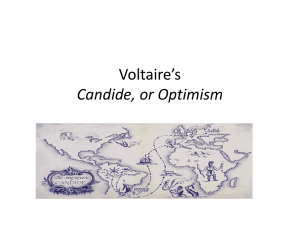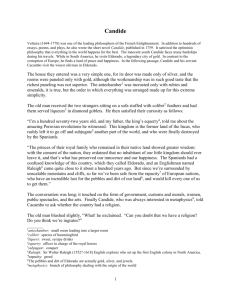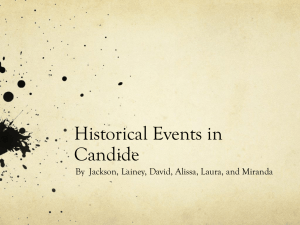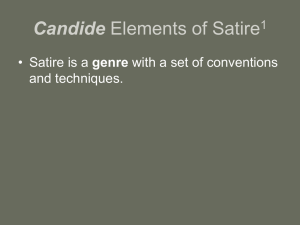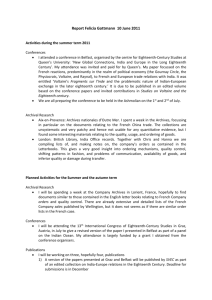Candide - Jordan Larson`s High School Portfolio
advertisement
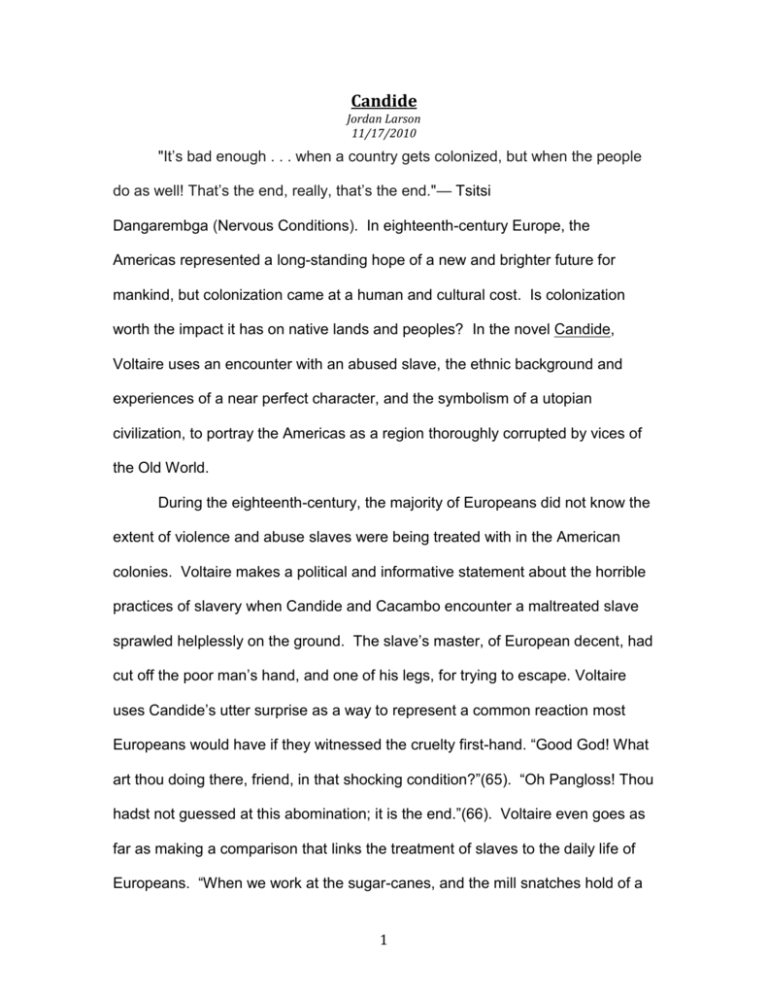
Candide Jordan Larson 11/17/2010 "It’s bad enough . . . when a country gets colonized, but when the people do as well! That’s the end, really, that’s the end."— Tsitsi Dangarembga (Nervous Conditions). In eighteenth-century Europe, the Americas represented a long-standing hope of a new and brighter future for mankind, but colonization came at a human and cultural cost. Is colonization worth the impact it has on native lands and peoples? In the novel Candide, Voltaire uses an encounter with an abused slave, the ethnic background and experiences of a near perfect character, and the symbolism of a utopian civilization, to portray the Americas as a region thoroughly corrupted by vices of the Old World. During the eighteenth-century, the majority of Europeans did not know the extent of violence and abuse slaves were being treated with in the American colonies. Voltaire makes a political and informative statement about the horrible practices of slavery when Candide and Cacambo encounter a maltreated slave sprawled helplessly on the ground. The slave’s master, of European decent, had cut off the poor man’s hand, and one of his legs, for trying to escape. Voltaire uses Candide’s utter surprise as a way to represent a common reaction most Europeans would have if they witnessed the cruelty first-hand. “Good God! What art thou doing there, friend, in that shocking condition?”(65). “Oh Pangloss! Thou hadst not guessed at this abomination; it is the end.”(66). Voltaire even goes as far as making a comparison that links the treatment of slaves to the daily life of Europeans. “When we work at the sugar-canes, and the mill snatches hold of a 1 finger, they cut off the hand; and when we attempt to run away, they cut off the leg; both cases have happened to me. This is the price at which you eat sugar in Europe.”(66). Candide’s exchange with the slave is very brief, yet it leaves a deep impression on the reader of Voltaire’s anti-slavery beliefs, and the disturbing reality of how slaves were treated in the American colonies. Another important character in the novel is Candide’s valet, Cacambo, who sheds a subtle and interesting light on the novel’s theme of European influence in America. Unlike any other character in the novel, Cacambo inspires perfect confidence, both in his intelligence and his moral uprightness. “This Cacambo was a very honest fellow.”(67). Voltaire portrays Cacambo as a near perfect person in order to investigate the effects of European influence on a South-American native. Cacambo was born in Tucuman, with a mixed American and one quarter Spanish heritage, in a time when Europe was already influencing much of South America. Cacambo saw much of the world through different occupations, “he had been a singing-boy, sacristan, sailor, monk, peddler, soldier, and lackey.”(44). His life experiences cause him to have a pessimistic view of the world, and cause him to say things such as, “You see that this hemisphere is not better than the others, take my word for it”(55), and “Indeed, the law of nature teaches us to kill our neighbour, and such is the practice all over the world.”(53). What if Cacambo had never traveled the world, and what if European influence had not reached South America when he was alive? Would his opinions have been different? A comparison between Cacambo and the 2 inhabitants of El Dorado answers these questions. Voltaire uses the mythical city of El Dorado in Candide to symbolize what a perfect civilization would be like; a civilization with zero contact from Europeans. Voltaire makes it very clear that European influence in the Americas, or anywhere else for that matter, is an atrocious and destructive thing. “none of the inhabitants should ever be permitted to quit this little kingdom; and this has preserved our innocence and happiness.”(59). “we have hitherto been sheltered from the rapaciousness of European nations, who have an inconceivable passion for the pebbles and dirt of our land, for the sake of which they would murder us to the last man.”(59-60). If Cacambo had been born in El Dorado, where no European influence existed, he would have felt right at home, “they were talking Peruvian; it was his mother tongue, for it is well known that Cacambo was born in Tucuman, in a village where no other language was spoken.”(57). He would have had a wildly different mindset and philosophy in a place such as El Dorado, where pessimism didn’t exist, in part because the inhabitants all thought alike, “here we are all of one opinion,”(61), and he would have been the perfect character. Voltaire expresses the idea that without outside influence, European specifically, a civilization can maintain its happiness, and live beyond common hardships. There is no doubt that Voltaire viewed European colonization of the New World as corrupt, damaging, and detrimental, to the Native Americans and their lands. He decisively and explicitly proved his opinions by writing Candide in way that yanks on the readers’ emotions for a brutalized human being, and in a way that causes the reader to compare a perfect civilization with the greedy and 3 corrupt European way of life. The over all subject of colonization continues to be a tricky one, because countries such as The United States of America, Canada, and countless others, would not exist today if they had not been colonized. Whether you are of Voltaire’s opinion or of a differing one, the novel Candide is a valuable source of insight into the issues of colonization, and is well worth reading and recognizing for it’s historical value. 4
